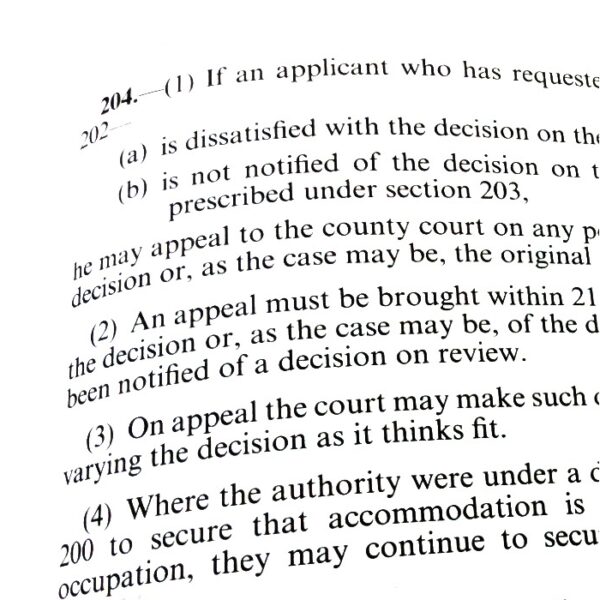Explaining appeal rights to homeless applicants
A recent Court of Appeal case clarified whether a delay in getting legal advice can be a good reason for a delay in issuing a homelessness appeal.

The judgment has also made me think about how bad some councils are at explaining appeal rights to housing applicants.
Al Ahmed
In Al Ahmed v Tower Hamlets LBC [2020] EWCA Civ 51 the Court of Appeal held that difficulties for homeless persons in obtaining a legal aid lawyer may be a 'good reason' for being late in appealing a s.202 review decision (in the county court, under s.204 of the Housing Act 1996).
This is helpful clarification. The 21-day deadline for filing an appeal is very short indeed. And it's often difficult to find a housing solicitor (or one with capacity to take on new cases). There are many areas where there are no solicitors with a legal aid contract for housing.
The court's reasons for allowing Mr Al Ahmed's appeal does not extend to a general rule that not being able to instruct a solicitor should always be accepted as good reason for missing the 21-day deadline.
As Sir Stephen Richards states in the judgment:
Where an applicant relies on the fact that he was unrepresented and was seeking legal aid as a reason for non-compliance, the circumstances will need to be examined [by the county court] with care, including scrutiny of the diligence with which he acted in seeking legal aid. And even if the court is satisfied as to good reason, that simply opens up a discretion to give permission for an appeal to be brought out of time.Para 35
Food for thought
Imagine yourself as a homeless applicant receiving an adverse review decision where you haven't had the benefit of legal advice.
While you can search online, the task of knowing what to do next is made worse by how bad many councils are at explaining the appeal process.
Often the review decision letter will only include a very basic explanation. Commonly this mirrors the legal requirement to inform the applicant of:
- The right to appeal to the county court on a point of law, and
- The period of time within which an appeal must be made (see s.203(5)).
But shouldn't we be making more of a genuine effort to help homeless people understand what steps they'll need to take if they want to explore the possibility of appealing? At the very least shouldn't we sign-post them to a webpage that helps them obtain advice?
With that in mind I've amended my review letters for councils so that, where appropriate, they briefly explain:
- What a 'point law' actually means.
After all, the words "you can appeal on a point of law" doesn't mean anything to your average housing applicant. You might as well be talking in Greek.
This is in addition to what my templates already do, in providing a website address which enables the applicant to search for a local housing solicitor, and explaining that:
- The deadline for appealing is not just 21 days from being notified of the review decision, but also any such longer period that the court may allow because they have a good reason for not appealing in time.
- They will need to contact a solicitor specialising in housing if they need advice on whether an appeal is likely to be successful.
- Legal advice on homelessness is available free of charge if your income is below a certain amount.
If you manage a statutory service you should also consider what information you're providing as a matter of course about the right to challenge decisions, e.g. via leaflets and on your website.
Why
At this point some council managers might be thinking:
Why on earth would we want to help our service users challenge our decisions?
(Yes I know most of you are lovely, but I've actually worked for some managers that think like this).
Benefits
Well, the reasons are pretty obvious:
- Councils should not actually be making fundamental legal errors in the first place, when deciding whether homeless persons qualify for help. And certainly not on review.
- You want feedback on the quality of your decision-making.
- Advice and advocacy services provide a valuable check on how services are being delivered.
Ultimately local advice services help us raise our game. If you know that unlawful decisions and poor practices are going to be challenged, we're incentivised to ensure that staff have the necessary knowledge and skills.
But Al Ahmed also demonstrates that it can actually be to a councils' advantage to provide a bit more guidance about appealing when notifying adverse review decisions.
This is because if the county court has to evaluate, like in Al Ahmed, whether the applicant couldn't obtain legal representation in good time they're less likely to exercise the power to extend the 21-day deadline if the decision letter included information that should have enabled a reasonably diligent applicant to obtain legal representation.
Resources
The following are available in the Resources section of this website.
Letters for applicants & advisors
Letters for applicants and advocates in relation to homeless applications.
Guide to homelessness reviews
If you're reviewing what information your council provides I have a guide which explains the homelessness review process (Welsh version here). The guide can be used to create a leaflet or suite of web-pages. It also explains what a 'point of law' is (at pages 10 to 11).
Help
I also provide the following services:
Section 202 review service
Service managers needing help with reviews can contact me for a quote.
Training
I also provide in-house training, including a popular course on s.202 reviews.
Posted in category: Resources s202 reviews s204 appeals
Comments